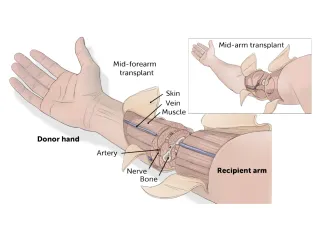The Boston Children's Hand Transplant Program is a research study to assess the clinical effectiveness and safety of pediatric hand transplantation.
The Hand Transplant Program at Boston Children's Hospital is a research study that has been reviewed and approved by Boston Children's Institutional Review Board. It is the first pediatric hand transplant program in the world.
Hand transplants are a new medical procedure, most of which are being done as part of research protocols. The first hand transplant in the United States was performed in 1999, and since then over 50 have been done on adults worldwide. To date, there have been no transplants from a donor to a genetically different pediatric patient.
The Hand Transplant Program is being performed under a research protocol which will evaluate the safety and efficacy of hand transplantation in children. Data will be collected on patients who receive a hand transplant as part of this study to measure the outcomes of the procedure and the patients' progress. Patients enrolled in the study will be followed for 10 years or longer.
Boston Children's Hospital has one of the largest pediatric transplant centers in the country. Our transplant team has extensive experience with solid organ transplants and immunosuppression. This strength, along with our renowned hand surgery and rehabilitation team, research capabilities and pediatric background gives us a unique opportunity to offer this experimental procedure to children who may benefit from it.

About hand transplants
During a hand transplantation procedure, hands are recovered from a deceased donor and attached to a living recipient. It's an experimental reconstructive procedure, that when performed successfully, and followed by appropriate rehabilitation, may offer an opportunity to improve the quality of life of the recipient.
Hand transplants present unique challenges not seen in most organ transplants. First, the loss of a hand or hands is not life-threatening, so the decision to have a hand transplant cannot be made lightly; each case must be considered very carefully. This serious medical procedure comes with inherent significant risks; each individual considering participation in this research study must discuss the risks in detail with the principal investigator and research staff.
And unlike other transplants, in which the transplanted organ automatically functions when placed in the recipient, a hand transplant recipient must undergo extensive physical therapy to gain as much functionality as possible. This rehabilitation may take years.
As with any other transplant, after patients receive a new hand they must take immunosuppression medications for the remainder of their lives — or as long as the hands are in place — which will keep their immune systems from attacking the new organ.
Despite these challenges, the medical field's experience with adult hand transplants, along with constantly evolving transplant techniques, has laid important groundwork for Boston Children's specialists.

